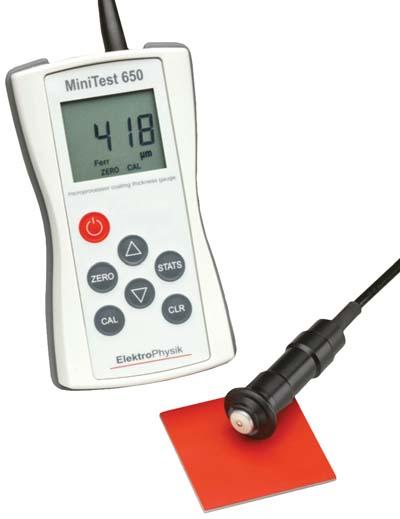
The battery-operated gage from Paul N. Gardner Co. Oinc. features a backlit display and a one meter sensor cable. The newly developed one pole sensor is made of a wear-and-tear resistant carbide material to ensure a virtually unlimited life cycle under normal condition use. An optimal ram — and impact — protection is provided through the rubber rimmed casing. Via an USB interface, the MiniTest 650 can be connected to a PC for on-line measurements or display of the statistics.
MiniTest 650 is available in three different models: with a magnetic-induction sensor for measurements on steel substrates, with an eddy currents sensor for measurements on non-ferrous metals and with a dual sensor for measuring on both steel or non-ferrous metals Its dual sensor identifies the substrate material. Upon contact with the surface, the gage automatically switches to the suitable measuring principle based on your application. The measuring principle conforms to the DIN, ISO, BS and ASTM norms and standards.
Designed for durability and high-precision, MiniTest 650 is the ideal tool for any measuring task in the finishing industry. The rugged and easy-to-handle thickness gage combines extended mechanical life on the one hand and high accuracy on the other hand to meet the requirements of any professional user in the shipbuilding, automotive, bridge building, construction or other industry. According to model, MiniTest 650 is suitable to measure: any non-magnetic coatings such as paint, enamel, chrome and zinc on steel any insulating coatings on non-ferrous metals such as paint, anodizing, ceramics on aluminum, copper, zinc die-cast, brass, etc.
Contact Details
Related Glossary Terms
- ceramics
ceramics
Cutting tool materials based on aluminum oxide and silicon nitride. Ceramic tools can withstand higher cutting speeds than cemented carbide tools when machining hardened steels, cast irons and high-temperature alloys.






